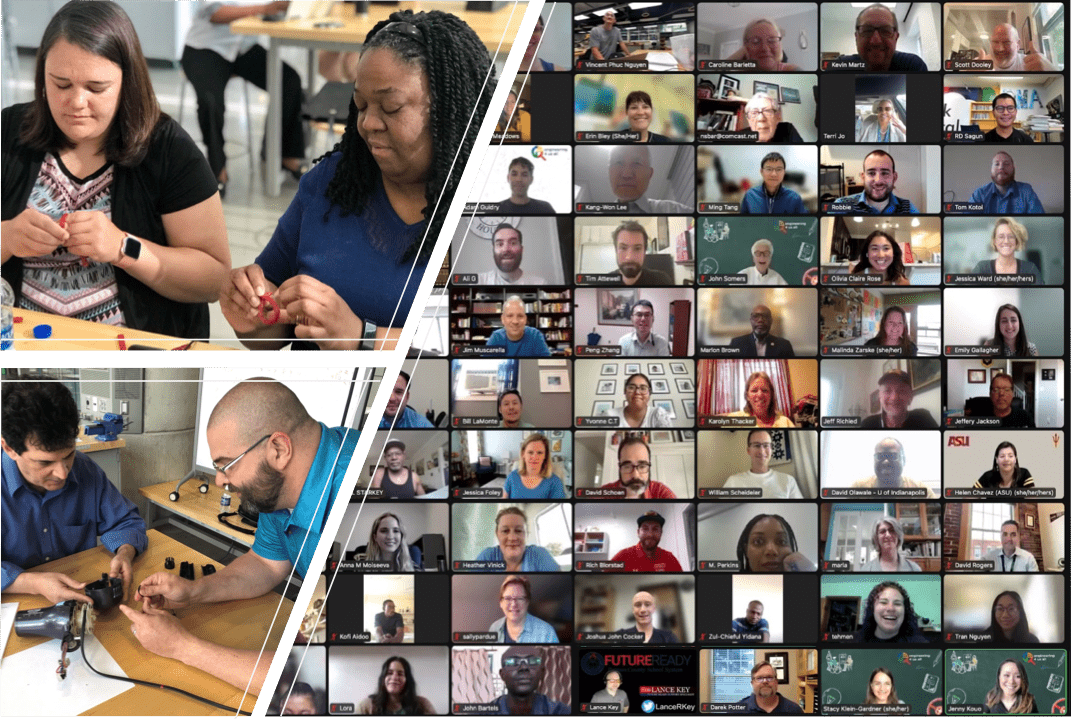For Teachers
e4usa Curriculum and Support Pave the Way for Student Growth and Teacher Excellence.

e4usa Curriculum
The e4usa curriculum is holistic, providing an online guide with opportunities for teacher personalization and autonomy, focusing on student decision-making. It allows room for leveraging each teacher’s own curriculum, tools, knowledge, and skill.
It serves as a scaffold for teaching engineering awareness, engineering in society, and engineering design practices through iterative design challenges, yet it invites teachers to incorporate their students’ interests, local needs, community partners, and personal expectations.
Professional Development and Community of Practice
e4usa offers essential Professional Learning (PL) to teachers, includes a series of webinars to introduce teachers to the e4usa mission and curriculum, preparing them for a face-to-face, interactive summer workshop at partner institutions' campuses. Ongoing support is provided with online resources and timely PL sessions throughout the academic year. The PL workshops create a strong Community of Practice, connecting teachers, students, faculty members, leaders, and e4usa team members for support and mentorship.
Through hands-on projects and mentoring, e4usa gives students an outstanding foundation in engineering principles and design thinking. We have embraced this partnership as we feel e4usa gives our students the tools they need to face the innovative engineering challenges of tomorrow.
Minimum Expectations of School Sites, Teachers, and Students
The e4usa Curriculum has been designed with certain expectations for school sites, teachers, and students. These expectations specify the minimum acceptable levels of commitment to ensure a positive pilot course experience.
- The course must be offered as a full-year course.
- The class should have a minimum of 100 hours of instruction before the summative course examination, which is scheduled during the second week of May.
- We assume 200 minutes of instructional time per week for a minimum of 30 weeks before the mid-May summative examination.
- The course schedule should allow sufficient time for students to work on engineering design projects between the start and end of the class meeting times.
- Adequate tools and facilities must be provided to enable students to create prototypes of their design projects.
- Teachers should be given adequate time during the school day to properly prepare for and generate curricular materials in response to student design project concepts.
- School sites should support each e4usa teacher's attendance at a Summer Institute and participation in virtual or on-site professional development sessions throughout the academic year.
- A registration fee of $1,400 should be submitted to cover the expenses associated with year-long professional learning, including Summer Professional Development.
- Teachers should be comfortable with uncertainty and be willing to guide students as they attempt projects for which a single solution does not exist.
- Teachers should be comfortable teaching basic mathematics concepts during the course.
- Teachers should be willing to learn alongside students to support their design project efforts and generate necessary curricular resources in response to student design project concepts.
- Teachers should be willing to engage in ongoing professional development activities, such as online learning communities.
- Students will have successfully completed algebra I.
- Students will work in teams and will contribute equitably to the design, construction and testing of an engineered solution.